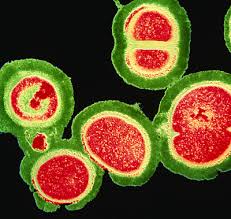 Methicillin-resistant Staphylococcus Aureus, commonly called MRSA, is a type of bacteria resistant to many of the antibiotics we use today. It is most dangerous to patients in healthcare settings, who often have compromised immune systems that allow MRSA to spread in their bodies. When MRSA infections reached their peak in the mid-2000s, nearly 100,000 people died as a result of infections from the bacteria each year.
Methicillin-resistant Staphylococcus Aureus, commonly called MRSA, is a type of bacteria resistant to many of the antibiotics we use today. It is most dangerous to patients in healthcare settings, who often have compromised immune systems that allow MRSA to spread in their bodies. When MRSA infections reached their peak in the mid-2000s, nearly 100,000 people died as a result of infections from the bacteria each year.
Since then, the U.S. Centers for Disease Control has been working to find ways to reduce the spread of MRSA. And their efforts have been working. From 2005 to 2008, MRSA infections that began in healthcare settings declined nearly 30 percent.
Last week, the New England Journal of Medicine published a new, sweeping study on MRSA infections that included more than 74,000 hospital patients – the largest of its kind on the topic.
The study compared two prevention techniques: screening patients for MRSA infections and treating those who tested positive, and treating every patient in the intensive care unit as if he had MRSA. The study found that treating each patient in intensive care units – which entailed washing with special disinfectant soaps and using antibacterial ointments – reduced the number of MRSA infections by 37 percent, and cuts the rate of bloodstream infections by 44 percent.
As for next steps, the CDC is developing recommendations for hospitals across the country to use in combating MRSA.



Hospitals not only treat infections — they can also cause them. A new government report notes that very little progress has been made in reducing what are called health care-associated infections. The most common are infections of the urinary tract, surgical site and bloodstream. Thus, a system that prevents diseases before more costly treatment is required.
This article is very nice for health . MRSA is is a bacteria that is resistant to many antibiotics.MRSA infections are skin infections. MRSA is most dangerous to patients in healthcare settings. Thank You For sharing the information.